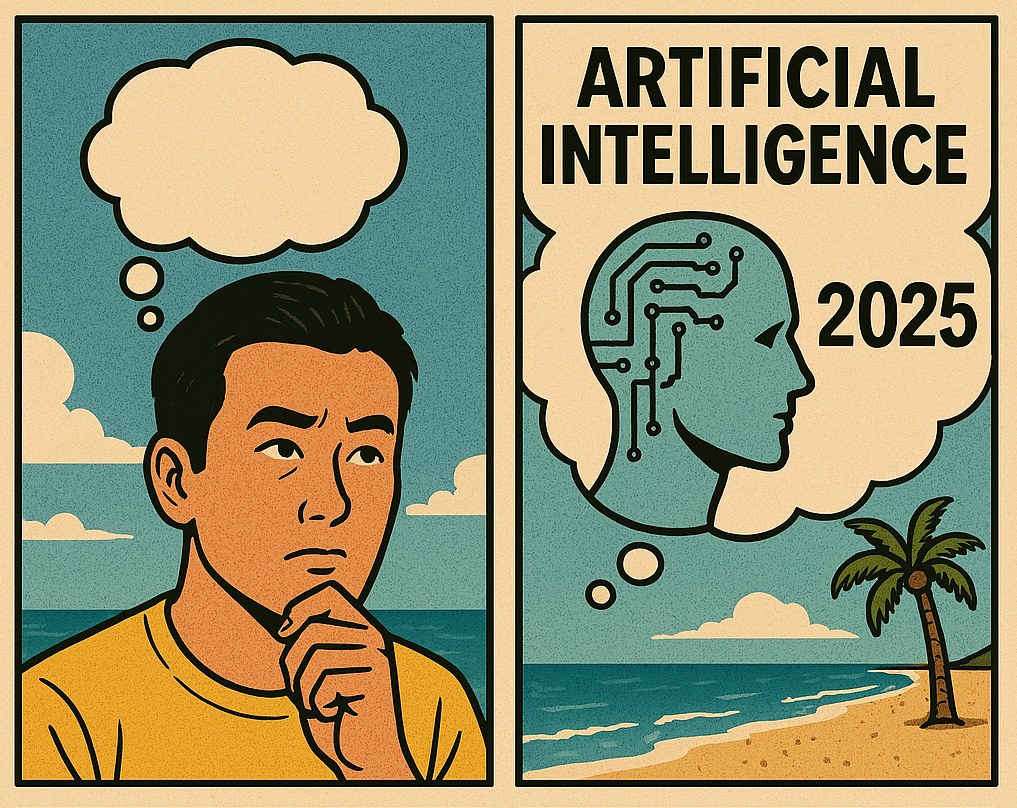by Eric Li — roaming coder, shipping AI stuff from anywhere with Wi-Fi
As the Engineering Lead at Acorn, I spend a lot of time thinking about the future—not just of code or infrastructure, but of learning itself. Every week, we ask ourselves: how can we use AI not just to automate, but to enrich? How can we make accessing deep knowledge feel as natural and delightful as listening to your favorite song?
2024 was a year of groundwork—LLMs got faster, context windows exploded, and consumer awareness grew. But 2025? This is the year AI becomes invisible in the best way: it will be embedded in our everyday tools, quietly enhancing how we learn, share, and connect. As we build the next chapter of Acorn, here are six shifts I’m personally watching and preparing for.

As we look ahead to 2025, artificial intelligence is no longer just a tool for developers or a feature in shiny new products—it’s becoming the operating system for how we create, work, and experience the world. At Acorn, where our mission is to make knowledge accessible through audio-first learning, understanding where AI is going helps us guide how our platform evolves and empowers our users. Below are six key shifts we’re watching closely, not just as technologists, but as knowledge builders.
1. Truth Meets Incentives: The Emergence of Prediction-Powered Journalism
In a world flooded with clickbait and speculation, AI-powered betting markets may become the most credible source of truth. Imagine journalists placing bets on their investigations—wagers that are backed not by clicks, but by outcomes. As machine learning models monitor and surface market-based insights, AI may begin to curate stories not based on popularity, but on predictive consensus. Acorn could one day use similar signals to vet trending knowledge—turning public bets into signals for what’s worth listening to.
2. The Age of Consumer-Built Software is Here
We’ve seen the rise of AI copilots for coders. But 2025 will be the year everyday users become creators—building custom tools, dashboards, or home routines using natural language or drag-and-drop agents. This unlocks a future where your personalized podcast playlist, focus timer, or knowledge tracker on Acorn isn’t just customizable—it’s auto-generated based on how you learn and live.
Think: “Build me a podcast playlist that teaches me negotiation skills in 15-minute chunks during my morning walk.” AI agents will make that your new normal.
3. AR + AI: A Quiet Transformation
While augmented reality is still in its early innings, it’s AI that will define its value. Think of it as the brain powering your AR glasses—understanding your context, summarizing key info, and surfacing helpful content in real time. Imagine walking into a library, and your glasses quietly highlight book summaries from Acorn that match your current interests or goals.
The building blocks—lighter devices, smarter models, and intuitive 3D interfaces—are quietly aligning. Within a few years, our entire interface with knowledge may shift from screens to spatial, AI-enhanced layers of understanding.
4. Talent Flow: From AI Labs to Real-World Impact
Top AI talent is increasingly leaving research labs to reshape traditional industries from within. The next creative leap won’t come from building better models, but from embedding those models into sectors hungry for reinvention—education, healthcare, storytelling. Acorn stands at this intersection. We’re not here to build the next GPT—we’re here to unlock its magic for learners, creators, and micro-entrepreneurs.
We expect to see the rise of domain-specific copilots that help podcasters generate episode outlines, summarize listener questions, or match audio clips with viral trends—all powered by AI but tuned by human taste.
5. Small, Sharp, and Scalable: AI-Native Businesses Bloom
What happens when AI takes care of logistics, content creation, billing, and marketing? You get a new breed of small business: ultra-niche, deeply personal, but economically scalable. These aren’t your typical startups—they’re creative projects made viable through AI.
At Acorn, we believe the future of knowledge consumption isn’t mass production—it’s personalized curation. We’re already seeing educators, therapists, and creators use Acorn’s tools to share insights in ways that feel more artisanal than algorithmic. With AI doing the heavy lifting, your passion project might just become your full-time job.
6. Cognition-Centric Companies Are Coming
Imagine a company where AI is not a tool, but the CEO, COO, and entire ops team—making decisions, routing workflows, and analyzing feedback in real time. These “cognicos” will be designed for machine-led reasoning, with humans in roles of strategic oversight and creative innovation.
This isn’t science fiction. We’re already seeing AI orchestrate customer support, sales funnels, and content operations across startups. For Acorn, it opens the door to dynamic content recommendation engines that evolve based on user behavior, seasonality, or even mood—turning the app into an adaptive learning companion rather than a static library.
Looking Ahead: AI Is Only Half the Story As we build toward this AI-native future, we hold onto a core belief: technology should amplify what makes us human, not replace it. The more sophisticated our tools become, the more we’ll crave authenticity, meaning, and connection.
At Acorn, we’re committed to building products that reflect this duality—leveraging AI to remove friction, but keeping people at the heart of every experience. Whether it’s a curated podcast, a summarized book, or a new learning series, the goal is to make the pursuit of knowledge more joyful, more accessible, and more human.
Let’s see where 2025 takes us.